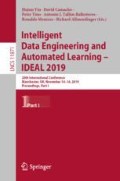Abstract
Frauds on the purchasing area impacts companies all around the globe. One of the possibilities to tackle this issue is through the usage of audits, however, due to the massive volume of the data available today, it is becoming impossible to manually check all the transactions of a company, hence only a small sample of the data is verified. This work presents a new approach through the usage of signature detection with clustering techniques to increase the probability of inclusion of fraud-related documents in sample sets of transactions to be audited. Due to a non-existence of a public database related to the purchase area of companies for fraud detection, this work uses real procurement data to compare the probability of selecting a fraudulent document into a data sample via random sampling versus the proposed model as well as exploring what would be the best clustering algorithm for this specific problem. The proposed model improves the current state-of-the-art since it does not require pre-classified datasets to work, is capable of operating with a very high number of data records and does not need manual intervention. Preliminary results show that the probability of including a fraudulent document on the sample via the proposed model is approximately seven times higher than random sampling.
Access this chapter
Tax calculation will be finalised at checkout
Purchases are for personal use only
References
Association of Certified Fraud Examiners (ACFE). Report to the nations. Austin, USA (2016). https://www.acfe.com/rttn2016/docs/2016-report-to-the-nations.pdf. Accessed 3 Mar 2019
Association of Certified Fraud Examiners (ACFE). Report to the nations. Austin, USA (2018). https://s3-us-west-2.amazonaws.com/acfepublic/2018-report-to-the-nations.pdf. Accessed 3 Mar 2019
Huber, M., Imhof, D.: Machine Learning with screens for detecting Bid-Rigging Cartels. Working Papers SES. [s. l.], n. 494, pp. 1–28 (2018)
Imhof, D., Karagök, Y., Rutz, S.: Screening for bid rigging-does it work? J. Compet. Law Econ. 14(2), 235–261 (2018)
Jonasson, J., Oloifsson, M., Monstein, H.J.: Classification, identification and subtyping of bacteria based on pyrosequencing and signature matching of 16S rDNA fragments. Apmis. 110(3), 263–272 (2002)
Popat, S., Emmanuel, M.: Review and comparative study of clustering techniques. Int. J. Comput. Sci. Inf. Technol. 5(1), 805–812 (2014)
Smith, R., et al.: Evaluating GPUs for network packet signature matching. In: Proceeding of the 2009 IEEE International Symposium on Performance Analysis of Systems and Software, Boston, MA, USA, pp. 175–184. IEEE (2009)
Transparency International. Corruption Perception Index (2017). https://www.transparency.org/news/feature/corruption_perceptions_index_2017#table. Accessed 3 Mar 2019
Xu, R., Wunsch II., D.: Survey of clustering algorithms. IEEE Trans. Neural Netw. 16(3), 645–678 (2005)
Westerski, A., et al.: Prediction of enterprise purchases using Markov models in procurement analytics applications. Procedia Comput. Sci. 60, 1357–1366 (2015)
Zaremski, A., Wing, J.: Signature matching: a key to reuse. In: Proceedings of the 1st ACM SIGSOFT Symposium on Foundations of Software Engineering, Los Angeles, California, USA, pp. 182–190. ACM (1993)
Pedregosa, et al.: Scikit-learn: machine learning in python. JMLR 12, 2825–2830 (2011)
Ding, C., He, X.: K-means clustering via principal component analysis, vol. 29 (2004). https://doi.org/10.1145/1015330.1015408
Xu, D., Tian, Y.: A comprehensive survey of clustering algorithms. Ann. Data Sci. 2(2), 165–193 (2015)
Baader, G., Krcmar, H.: Reducing false positives in fraud detection: Combining the red flag approach with process mining. Int. J. Account. Inf. Syst. 31, 1–16 (2018)
Islam, A.K., et al.: Fraud detection in ERP systems using scenario matching. In: Rannenberg, K., Varadharajan, V., Weber, C. (eds.) SEC 2010. IFIP AICT, vol. 330, pp. 112–123. Springer, Heidelberg (2010). https://doi.org/10.1007/978-3-642-15257-3_11
Author information
Authors and Affiliations
Corresponding author
Editor information
Editors and Affiliations
Rights and permissions
Copyright information
© 2019 Springer Nature Switzerland AG
About this paper
Cite this paper
Oliverio, W.F.M., Silva, A.B., Rigo, S.J., da Costa, R.L.B. (2019). A Hybrid Model for Fraud Detection on Purchase Orders. In: Yin, H., Camacho, D., Tino, P., Tallón-Ballesteros, A., Menezes, R., Allmendinger, R. (eds) Intelligent Data Engineering and Automated Learning – IDEAL 2019. IDEAL 2019. Lecture Notes in Computer Science(), vol 11871. Springer, Cham. https://doi.org/10.1007/978-3-030-33607-3_13
Download citation
DOI: https://doi.org/10.1007/978-3-030-33607-3_13
Published:
Publisher Name: Springer, Cham
Print ISBN: 978-3-030-33606-6
Online ISBN: 978-3-030-33607-3
eBook Packages: Computer ScienceComputer Science (R0)

